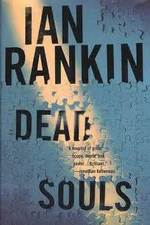 Dead Souls
Dead Souls
by Ian Rankin
Series: John Rebus, #10
Hardcover, 406 pg.
St. Martin’s Press, 1999
Read: November 10 – 13, 2017

For the best part of an hour, Rebus had been trying to blink away a hangover, which was about as much exercise as he could sustain. He’d planted himself on benches and against walls, wiping his brow even though Edinburgh’s early spring was a blood relative of midwinter. His shirt was damp against his back, uncomfortably tight every time he rose to his feet.
This might actually be the high point for Rebus in this novel — at least as far as the way he feels goes. The bad news is, this is from Chapter 1. Clearly, Jack Morton’s influence has clearly ended. Rebus is moments away from doing something he’ll regret almost instantly and that will have ramifications on everything he does for the foreseeable future, some of which will likely haunt him for more than that.
Which almost seems par for the course, I realize as I type that.
Anyway, Dead Souls focuses on crimes against children and what that can do to them — not just at the moment they’re victimized, but years later. There are also unintended (and fully intended consequences of crimes against adults throughout the book — Rebus’ own hands aren’t entirely clean here. Rebus’ actions in the opening pages cast enough of a shadow on him that his very brief involvement on another case is used by the defense to cast a shadow on the police’s investigation. He’s also tasked to investigate the apparent suicide of a police detective, informally, anyway. His main task is to work with Siobhan Clarke and a rookie to be a very obvious police presence to a convicted multiple-murderer, recently released and deported from the US back to Scotland. They really can’t do anything other than be visible for a few days until money runs out on the operation, but no one who knows this killer has any doubt that he’ll strike again, and the police are trying to discourage that. Unofficially, Rebus makes things uncomfortable for a pedophile in his new home — an act that will not go well and will spiral out of control — and he’s helping an old girlfriend look for her missing son.
Confused? Yeah, sure, I am — and I wrote that summary. Somehow, Rankin is able to take all that mess and assemble it into a novel that actually makes sense — with all of these stories being tied together, not just with over-lapping themes, but in reality in some sort of 6 degrees of separation fashion — even excluding DI Rebus. It’s really very impressive watching how Rankin weaves every strand of story and character in this novel — it always is, but this web seems more intricate than usual.
The other police in this novel interest me — I won’t go down the list, but those who can’t see why he cares about something, those who can’t understand why he’d do something with so little regard to consequences are on one end — the other end is filled by people (like Clarke) who know exactly what kind of man he is, and without approving or participating in the less-than-savory aspects his methods, can use him and them for good.
…he wondered why it was he was only ever happy on rewind. He thought back to times when he’d been happy, realising that at the time he hadn’t felt happy; it was only in retrospect that it dawned on him. Why was that?
There’s very little light in this novel, there’s introspection, there’s despair, there’s hatred, fear, prejudice, and opportunists taking advantage of all of that. But somehow the book never seems slow or ponderous — just Rebus chugging along, doing his thing. There’s also some strong action — some we see as it happens, but most we hear about after the fact (years or days alter). If you stop and think about how many criminal seem to “get away” with their crimes (as defined by not being charged/tried), it’s not that satisfying. If you think about the book in terms of Rebus (and through him, the reader) understanding what happened and why — it’s satisfying, not really cheerful, but satisfying in that regard.
The souls that are dead here have been killed by various means and methods over time — some realize that’s what they are, some haven’t a clue — some come to realize it in these pages (and some try to revitalize themselves). By and large, they’re dead souls walking, and seem intent on taking others with them. The question is: is DI Rebus among them?
I’m really not sure if I’ve said anything worthwhile about the book — it’s impressive, immersive and will not let you go — even days after finishing it. I don’t know that this is a bad one to be your first Rebus novel — you may be willing to cut him more slack for his questionable actions if you’ve got a history with him than you would be otherwise, however. For me, this is just further proof that Rankin is one of the best and is getting better (or was, at this point in his career anyway)
—–




Bookstooge
Man, I don’t think I could read this. Just reading your review was tough enough.
HCNewton
And here’s where my post failed. It’s really not that hard to read, not hard to follow. It’s when you stop and think about what you’ve been reading – both the great tangled plot and what is behind all the actions of the characters, that’s when it (can) gets tough. The reading is pretty easy. It’s living with having read it.
Bookstooge
I meant tough as in subject matter.
HCNewton
So I assumed, but figured I’d cover my bases